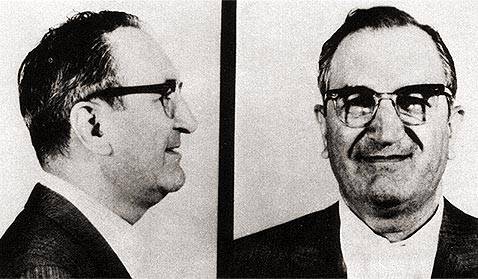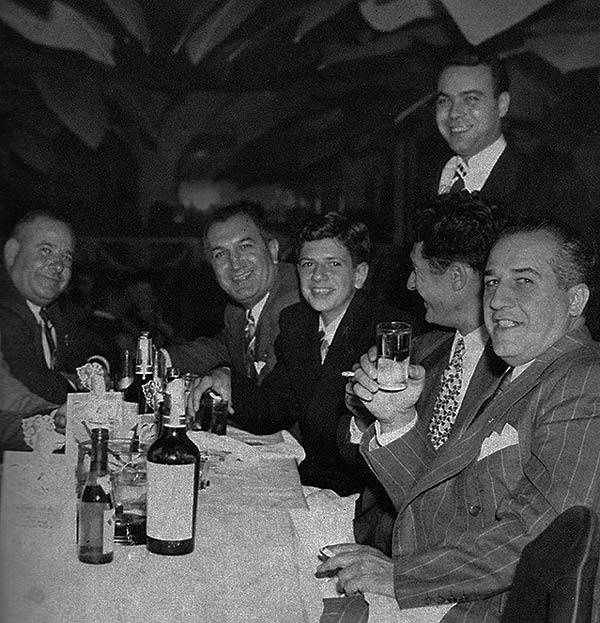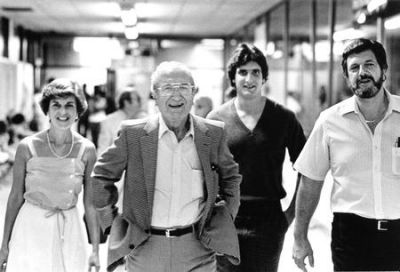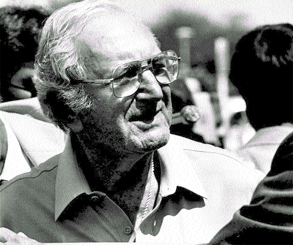<Back to Index>
- Boss of the Bonanno Family Giuseppe Carlo "Joe Bananas" Bonanno, 1905
PAGE SPONSOR
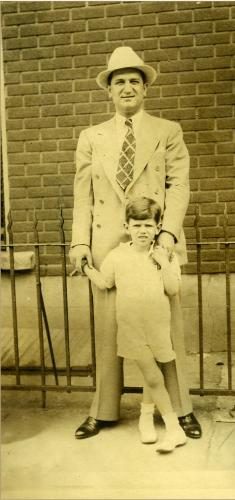
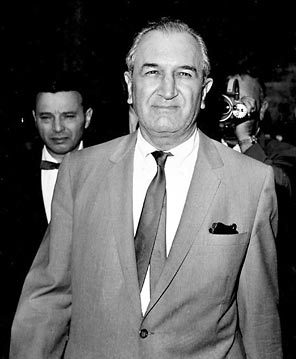
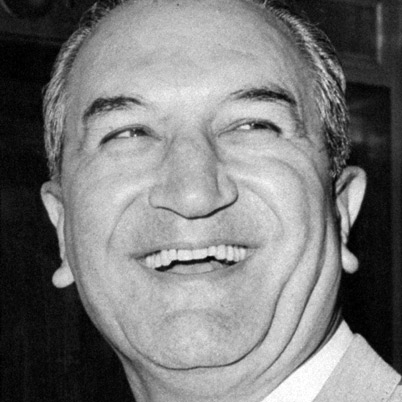
Joseph Charles Bonanno, Sr. (January 18, 1905 – May 11, 2002) was a Sicilian born American mafioso who became the boss of the Bonanno crime family. He was nicknamed "Joe Bananas," a name he despised.
Bonanno was born Giuseppe Carlo Bonanno on January 18, 1905 in Castellammare del Golfo, a town on the western coast of Sicily. When he was three years old, his family moved to the United States and settled in the Williamsburg neighborhood in Brooklyn for about 10 years before returning to Italy. Bonanno slipped back into the United States in 1924 by stowing away on a Cuban fishing boat bound for Tampa. By all accounts, he'd become active in the Mafia during his youth in Italy, and he fled to the United States after Benito Mussolini initiated a crackdown. Bonanno himself claimed years later that he fled because he was ardently anti - Fascist. However, the former account is more likely, since several other Castellammarese mafiosi fled to the United States around the same time.
Eventually, Bonanno became involved in bootlegging activities, and soon joined a Mafia family led by another Castellammarese, Salvatore Maranzano.
Almost from the beginning, Bonanno was recognized by his accomplices in Brooklyn as a man with superior organizational skills and quick instincts. He also became known to the leader of Mafia activities in New York, Joe "the Boss" Masseria. Masseria became increasingly suspicious of the growing number of Castellammarese in Brooklyn. He sensed they were gradually dissociating themselves from his overall leadership.
In 1927 violence broke out between the two rival factions that shortly developed into all - out war. This war between Masseria and Maranzano became known as the Castellammarese War. It continued for more than four years. By 1930, Maranzano’s chief aides were Bonanno (as underboss and chief of staff), Tommy Lucchese and Joseph Magliocco. Tommy Gagliano ran another gang that supported Maranzano. The Buffalo, New York, mob boss Stefano Magaddino, another Castellammarese, also supported Maranzano. Magaddino's son was Peter Magaddino, a boyhood friend of Bonanno from his student days in Palermo. Masseria had Lucky Luciano, Vito Genovese, Joe Adonis, Carlo Gambino, Albert Anastasia and Frank Costello on his side.
However, a third, secret, faction soon emerged, composed of younger mafiosi on both sides disgusted with the old - world predilections of Masseria, Maranzano and other old - line mafiosi, whom they called "Mustache Petes." This group of "Young Turk" mafiosi was led by Luciano and included Costello, Genovese, Adonis, Gambino and Anastasia on the Masseria side and Profaci, Gagliano, Lucchese, Magliocco and Magaddino on the Maranzano side. Although Bonanno was more steeped in the old - school traditions of "honor," "tradition," "respect" and "dignity" than others of his generation, he saw the need to modernize and joined forces with the Young Turks.
By
1931, momentum had shifted to Maranzano and the Castellammarese
faction. They were better organized and more unified than Masseria’s
men, some of whom began to defect. Luciano and Genovese urged Masseria
to make peace with Maranzano, but Masseria stubbornly refused. In the
end, Luciano and Genovese concluded a secret deal with Maranzano. In
return for safety and equal status for Luciano in Maranzano's new
organization, Luciano and Genovese murdered Masseria and ended the
Castellammarese War.
After Masseria's death, Maranzano outlined a peace plan to all the Sicilian and Italian gang leaders in the United States. Under this plan there would be 24 gangs (to be known as “families”) throughout the United States who would elect their own boss. In New York City, five Mafia families were established, headed by Luciano, Profaci, Gagliano, Vincent Mangano and Maranzano respectively. At the head of the whole organization would be the capo di tutti capi (the boss of bosses), namely Maranzano. This final article of the plan did not please many of the gangsters, especially Luciano. As a consequence, Luciano arranged Maranzano's murder.
Bonanno was awarded most of Maranzano's crime family. At age 26, Bonanno became one of the youngest ever bosses of a crime family. Years later, Bonanno wrote in his autobiography that he didn't know about the plan to kill Maranzano, but this is highly unlikely; Luciano would have almost certainly had him killed as well had he still been loyal to Maranzano.
In place of the capo di tutti capi in Marazano's plan, Luciano established a national commission in which each of the families would be represented by their boss and to which each family would owe allegiance. Each family would be largely autonomous in their designated area, but the Commission would arbitrate disputes between gangs. The
purpose of this organization was to prevent another bloodletting like
the Castellammarese War, and according to Bonanno, it succeeded. The
establishment of the Commission ushered in more than 20 years of
relative "peace" to the New York and national organized crime scene, and
Bonanno wrote: "For nearly a thirty - year period after the
Castellammarese War no internal squabbles marred the unity of our Family
and no outside interference threatened the Family or me."
The Bonanno crime family's underbosses were Frank Garofalo and John Bonventre. While it was traditionally one of the smaller ones of the five New York families, it was more tight - knit than the others. With almost no internal dissension and little harassment from other gangs or the law, the Bonanno family prospered in the running of its loan sharking, bookmaking, numbers running, prostitution, and other illegal activities. In 1938, Bonanno left the country, then re-entered legally at Detroit so that he could apply for citizenship.
Bonanno's large cash position gleaned from crime allowed him to make many profitable real estate investments during the Great Depression. His legitimate business interests included areas as diverse as the garment industry (three coat factories and a laundry), cheese factories, funeral homes, and a trucking company. It was said that a Joe Bonanno owned funeral parlor in Brooklyn was utilized as a convenient front for disposing of bodies: the funeral home's clients were provided with double — decker coffins, and more than one body would be buried at once. By the time Bonanno became a US citizen in 1945, he was a multi - millionaire.
Unlike most of his compatriots, Bonanno largely eschewed the lavish lifestyle associated with gangsters of his time. He preferred meeting with his soldati in his Brooklyn home or at rural retreats. He did, however, have a decided preference for expensive cigars.
The only encounter Bonanno had with the law during these years was when a clothing factory that he partly owned was charged with violating the federal minimum wage and hour law. The company was fined $50; Bonanno was only a shareholder in the company and was not fined. Government officials later arrested Bonanno, claiming he had lied on his citizenship application by concealing a criminal conviction; the charge was dismissed in court.
Despite this, Bonanno was all but unknown to the general public until the disastrous Apalachin Conference of
1957. He was one of the few bosses not to be arrested. However, not
long afterward, a federal grand jury began a major investigation into
organized crime, and prosecutors identified him as the leader of a major
crime family. He was indicted for obstruction of justice after refusing to testify before the grand jury, but suffered a heart attack before the trial. After numerous postponements, the United States Court of Appeals threw out the indictment.
In 1931, two months after Maranzano was murdered, Bonanno was married to Fay Labruzzo. They had three children: Salvatore "Bill" Bonanno, born 1932; Catherine, born 1934; and Joseph Charles Jr., born 1945.
As he prospered, Bonanno bought property in Hempstead, Long Island, and moved his family out of Brooklyn. When Bill was ten years old he developed a mastoid infection of his ear that led to his being transferred to a private boarding school in Tucson, Arizona. Bonanno and his wife would visit their son during the winter months. Eventually, Bonanno purchased a house in Tucson.
By the mid 1950s, the Commission that had held the peace for so many years was unraveling. Many of the original Dons had been convicted of crimes and either jailed or deported. Vito Genovese and Frank Costello were fighting for control of the Luciano family. Vincent Mangano had mysteriously disappeared and his place as capo had been taken over by Albert Anastasia, one of the most feared men in the syndicate. In October 1957 Anastasia was gunned down. Then in November the New York State Police raided the infamous Apalachin Meeting in rural Apalachin, New York. Dozens of capos – including Joseph Bonanno – were captured and charged with various crimes. Then in 1963 Joseph Valachi, a soldier in the Genovese family, under indictment for murderering a fellow inmate, broke the code of omertà. Valachi described in detail the organizational structure of the Mafia, unmasked many of the leaders and recalled old feuds and murders. Although none of his testimony led to any actual prosecutions, it was nonetheless devastating to the mob.
After the death of Joe Profaci, a very good friend of Bonanno and leader of the Profaci crime family, he was succeeded by another good friend of Bonanno's, Joe Magliocco. Soon, Magliocco began to have troubles with the rebellious Joe Gallo and his brothers Larry and Albert, who were now backed by Lucchese and Gambino. Meanwhile, Bonanno was also feeling threatened by Lucchese and Gambino. The two then planned to have Gambino and Lucchese killed, as well as Bonanno's cousin Magaddino and Frank DeSimone in Los Angeles. Magliocco gave the contract to one of his top hit men, Joseph Colombo. However, Colombo betrayed his boss and went instead to Gambino and Lucchese. Gambino called an emergency meeting of the Commission. They quickly realized that Magliocco could not have planned this by himself. Remembering how close Magliocco (and before him, Profaci) had been with Bonanno, it didn't take them long to conclude that Bonanno was the real mastermind.
At Gambino's suggestion, the Commission ordered Magliocco and Bonanno to appear for questioning. Bonanno didn't show up, but Magliocco did and confessed. In light of Magliocco's failing health, the Commission imposed a very lenient punishment — a $50,000 fine and ordering him to hand over leadership of his family to Colombo. Soon, Magliocco was dead from high blood pressure. They intended to let Bonanno off easily as well, wanting to avoid a repetition of the bloodbaths of the 1930s.
Bonanno was already becoming unpopular with other Mafia bosses; the head of the Buffalo crime family and Bonanno's cousin Stefano Magaddino once said in anger, "He's planting flags all over the world!" Some members of his family also thought he spent too much time away from New York, and more in Canada and Tucson, where he had business interests. After several months with no response from Bonanno, they removed him from power and replaced him with one of his capos, Gaspar DiGregorio. Bonanno, however, would not accept this. This resulted in his family breaking into two groups, the one led by DiGregorio, and the other headed by Bonanno and his son, Salvatore. Newspapers referred to this as "The Banana Split."
Since Bonanno refused to give up his position, the other Commission members felt it was time for drastic action. In October 1964, Bonanno was allegedly kidnapped by Buffalo Family members, Peter Magaddino and Antonino Magaddino. According to Bonanno, he was held captive in upstate New York by his cousin, Stefano Magaddino. Supposedly Magaddino represented the Commission, and told his cousin that he "took up too much space in the air", a Sicilian proverb for arrogance. After much talk, Bonanno was released. The Commission members believed he would finally retire and relinquish his power. Bonanno's account of events has been disputed based on the FBI recordings of New Jersey Boss Sam "the Plumber" Decavalcante.
Bonanno's
hold on his family had become tenuous in any event, however. Many
family members complained that Bonanno was almost never in New York and
spent his time at his second home in Tucson, Arizona.
In truth, however, Bonanno was unwilling to accept the commission's edict, and rallied several members of his family behind him. The family split into two factions, the DiGregorio supporters and the Bonanno loyalists. The Bonanno loyalists were led by Bonanno, his brother - in - law Frank Labruzzo and Bonanno's son Bill. There was no violence from either side until a 1966 Brooklyn sit - down. DiGregorio's men arrived at the meeting, and when Bill Bonanno arrived a large gun battle ensued. The DiGregorio's loyalists planned to wipe out the opposition but they failed and no one was killed. Further peace offers from both sides were spurned with the ongoing violence and murders. The Commission grew tired of the affair and replaced DiGregorio with Paul Sciacca, but the fighting carried on regardless.
The
war was finally brought to a close with Joe Bonanno, still in hiding,
suffering a heart attack and announcing his permanent retirement in
1968. Both factions came together under Sciacca's leadership. His replacement was Natale "Joe Diamonds" Evola as boss of the Bonanno family. Evola's leadership was short lived - his death (from natural causes) in 1973 brought Phillip "Rusty" Rastelli to the throne.
Bonanno and his son subsequently moved to Arizona, where he was at one time sent to jail by the Federal Bureau of Investigation to serve time for various offenses during his previous stay in that state. In 1983, he wrote his autobiography A Man of Honor, which was excerpted in the New York Daily News. The government seized the opportunity and questioned him about the Commission, hoping to prove its existence given that he spoke about it in his book. Technically, he kept the vow of omertà and answered no questions in government hearings, but many then current New York Mafia leaders were outraged at what he had said in his book and considered him to have already broken the vow. Bonanno boss Joe Massino was so disgusted and embarrassed by it that he began to refer to the family as the "Massino" family (although Massino himself later flipped and the "Massino" family name was never widely used).
Despite an arrest record dating back to the 1920s, Bonanno was never convicted of a serious crime. He was once fined $450 and held in contempt of court for refusing to testify in 1985. Assigned federal inmate number 07255-008, he was transferred from the Federal Correctional Institution in Tucson, Arizona, to the U.S. Medical Center for Federal Prisoners in Springfield, Missouri, due to ill health at his advanced age and released on November 1, 1986. Upon retirement, he was allowed to live in peace at his home in the Blenman - Elm neighborhood of Tucson, Arizona, with his family.
In April, 2002, Joseph Bonanno and his son, Bill Bonanno appeared on CBS News program 60 Minutes to be interviewed by Mike Wallace.
Bonanno,
the last remaining Mafia don who survived Italian fascism, Mustache
Petes, and his own bloody war, died on May 11, 2002 of heart failure at the age of 97. He is buried at Holy Hope Cemetery & Mausoleum in Tucson.
The Judge Dredd character Joe Bananas, henchman for Don Uggie Apelino, was named for Bonanno. In 1999, the Lifetime TV network produced a biographical film called Bonanno: A Godfather's Story. The
film chronicles the rise and fall of organized crime in the United
States. In 1991, Bonanno's daughter - in - law, Rosalie Profaci Bonanno,
published the memoir Mafia Marriage: My Story. This book was eventually converted to the 1993 Lifetime Network film Love, Honor, & Obey: The Last Mafia Marriage. In 2006, episode 66 of The Sopranos, "Members Only", Eugene Pontecorvo wants
to retire and uses Joe Bananas as an example of a retired mob member.
Eugene was informed that he wasn't a hockey player. In 2004 Joe's
daughter - in - law began putting Joe's personal items up for auction on
eBay. This continued until 2008. In 2009, Joe's cousin Thomas Bonanno
participated as a Mafia expert in the filming of the "Mafia vs. Yakuza"
episode of Deadliest Warrior, demonstrating his skills and marksmanship with a Thompson submachine gun, as well as talking about "true" Sicilian Mafia philosophy and culture.
